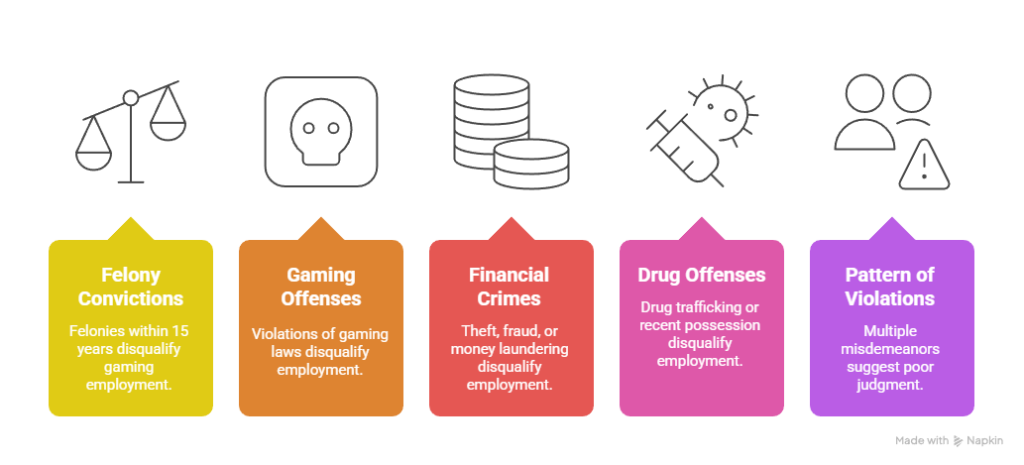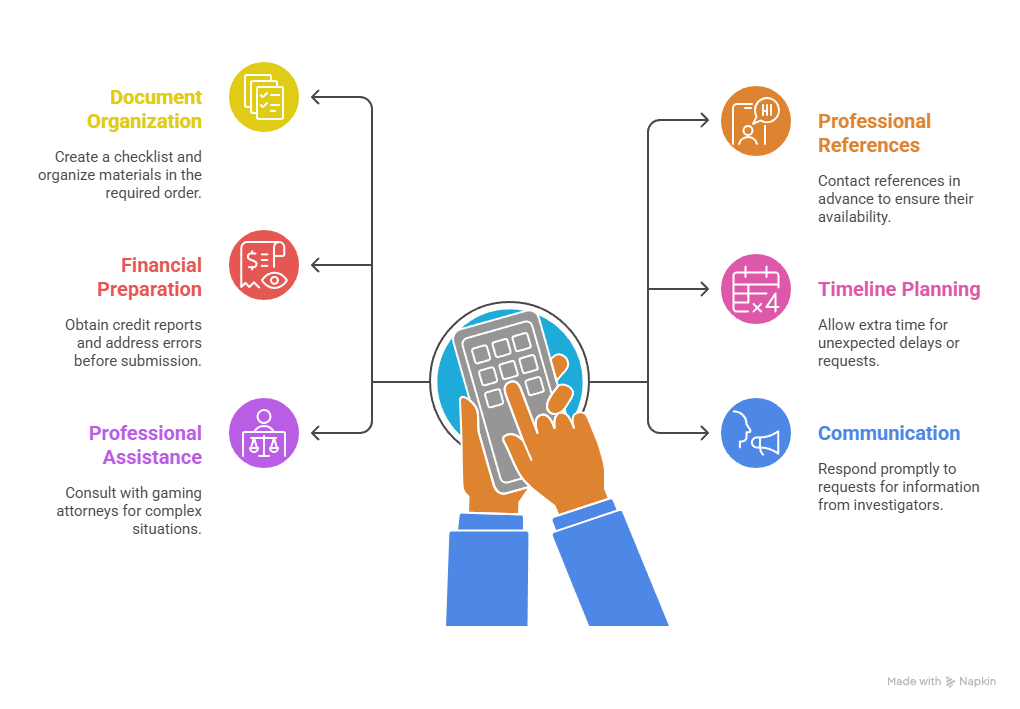Florida's casino background check process involves comprehensive screening through the Division of Pari-Mutuel Wagering, covering both land-based facilities and unique cruise ship gaming operations. The state requires occupational licenses for most gaming positions, with background investigations that can take 30-90 days depending on the license level and individual circumstances.
Key Takeaways
- Florida casino employees must obtain occupational licenses through the Division of Pari-Mutuel Wagering before starting work in gaming positions.
- Background checks cover criminal history, financial records, employment verification, and personal character references spanning 10+ years.
- Cruise ship gaming operations follow federal maritime jurisdiction combined with Florida licensing requirements for home-ported vessels.
- Disqualifying factors include felony convictions, gaming-related offenses, and financial crimes, though some violations may be eligible for waivers.
- Processing times typically range from 30-90 days, with expedited options available for certain license categories.
- Renewal requirements mandate updated background screenings every 2-3 years depending on license type and employee role.
Understanding Florida's Gaming Landscape and Background Check Requirements
Florida's gaming industry operates under a complex regulatory framework that distinguishes it from other states. The Florida Division of Pari-Mutuel Wagering oversees most gaming operations. This includes traditional pari-mutuel facilities, card rooms, and the emerging cruise ship gaming sector. Unlike states with comprehensive commercial casino legislation, Florida's gaming laws have evolved through decades of amendments and tribal gaming compacts.
The state's unique geographic position as a major cruise departure point creates additional regulatory considerations. Cruise ships operating from Florida ports must comply with both federal maritime gaming regulations and state licensing requirements. These requirements apply to employees who work on vessels that homeport in Florida. This dual jurisdiction system affects how background checks are conducted and processed.
Current statistics show that Florida employs over 45,000 people in various gaming-related positions. These positions span across pari-mutuel facilities, tribal casinos, and maritime gaming operations. Each employment category has specific background check requirements. These requirements reflect the risk level and regulatory oversight associated with different job functions. Therefore, understanding these distinctions is crucial for prospective gaming employees.
The regulatory environment in Florida also encompasses specific venue types with unique operational characteristics. Pari-mutuel facilities typically combine traditional horse or dog racing with card rooms and slot machine gaming. Tribal casinos operate under federal oversight through the National Indian Gaming Commission. Meanwhile, cruise ship gaming represents a growing sector that combines state licensing requirements with federal maritime regulations.
Types of Gaming Licenses and Background Check Levels

Florida gaming employment requires different license types based on job responsibilities and access levels. The Division of Pari-Mutuel Wagering categorizes positions into several distinct licensing tiers. Each tier has corresponding background investigation depth. Understanding these categories helps job seekers prepare appropriate documentation and set realistic timeline expectations. Additionally, different positions within gaming facilities require varying levels of security clearance based on their access to cash, gaming equipment, and sensitive operational areas.
| License Type | Background Check Depth | Processing Time | Annual Fee |
| Occupational License (Level 1) | Standard criminal and employment verification | 30-45 days | $75-150 |
| Gaming Employee License (Level 2) | Comprehensive financial and personal history | 60-90 days | $200-400 |
| Key Employee License | Extensive investigation including associates | 90-120 days | $500-1000 |
Level 1 occupational licenses apply to most entry-level positions. These include dealers, cashiers, and security personnel. The background investigation for these positions focuses on criminal history, employment verification, and basic financial responsibility indicators. Level 2 gaming employee licenses require more extensive investigation for supervisory roles and positions with significant cash handling responsibilities. These positions often involve access to gaming revenue, oversight of multiple employees, or responsibility for compliance monitoring.
Key Employee License Requirements
Key employee licenses represent the most thorough background investigation level. These are typically reserved for management positions, compliance officers, and individuals with significant operational authority. The investigations often include interviews with personal references, detailed financial audits, and comprehensive review of business associations dating back 10+ years.
The application process for key employee licenses involves additional documentation requirements. Candidates must provide detailed business association disclosures, comprehensive financial statements, and character references from multiple professional sources. Furthermore, the investigation timeline extends beyond standard processing periods due to the complexity of verification procedures.
Cruise Ship Gaming Specific Requirements
Maritime gaming operations present unique licensing challenges due to federal jurisdiction over international waters. Florida-based cruise employees working in gaming positions must satisfy both Coast Guard maritime licensing requirements and state gaming background checks. This dual system creates longer processing times and more complex documentation requirements.
The background investigation process for cruise ship gaming positions includes additional screening elements. These elements include passport verification, international criminal history checks, and maritime safety training certifications. Additionally, employees may need to undergo periodic re-screening more frequently than land-based gaming workers due to the international nature of cruise operations.
The Background Investigation Process Step-by-Step
Florida's casino background check process begins with submitting a complete application package to the Division of Pari-Mutuel Wagering. Applicants must provide extensive personal information, financial disclosures, and supporting documentation. This documentation enables investigators to conduct comprehensive screening. The process involves multiple verification stages and typically requires active participation from the applicant throughout the investigation period. Moreover, investigators may contact applicants directly for clarification or additional information during the review process.
Initial application review focuses on completeness and basic eligibility requirements. Applications missing required documentation or containing obvious disqualifiers may be rejected without full investigation. This saves time and fees for both applicants and the regulatory agency. Complete applications proceed to the formal background investigation phase within 7-10 business days of submission. During this initial review, investigators also verify that all required fees have been paid and that fingerprint cards are properly completed.
The investigation phase involves multiple concurrent verification processes running simultaneously to expedite completion. Investigators conduct criminal history checks through state and federal databases while simultaneously verifying employment and education claims. They review financial records for signs of instability or illegal activity and contact personal and professional references. This comprehensive approach ensures that all aspects of an applicant's background receive appropriate scrutiny. Final determination typically occurs within the stated processing timeframes, though complex cases may require additional investigation time. Applicants receive written notification of decisions, including specific reasons for any denials and information about appeal processes.
Common Disqualifying Factors and Waiver Possibilities
Florida gaming regulations establish clear disqualifying factors that automatically prevent licensing approval. However, the state also provides waiver processes for certain violations. The system recognizes that blanket prohibitions may exclude qualified candidates who pose minimal risk to gaming integrity. Understanding these factors helps job seekers assess their eligibility before investing time and money in the application process.
Automatic disqualifiers include felony convictions within the past 15 years, gaming-related criminal offenses, financial crimes involving theft or fraud, and certain drug-related convictions. The state also considers patterns of misdemeanor convictions that suggest poor judgment or inability to follow regulations. Sex offenses and violent crimes typically result in permanent disqualification regardless of timeframe. Additionally, any evidence of association with organized crime or illegal gambling operations creates immediate disqualification.

- Felony Convictions: Any felony within the past 15 years typically results in automatic disqualification from gaming employment
- Gaming-Related Offenses: Previous violations of gaming laws or regulations in any jurisdiction, including illegal gambling participation
- Financial Crimes: Theft, fraud, embezzlement, or money laundering convictions that demonstrate untrustworthiness with money
- Drug Offenses: Certain controlled substance violations, particularly trafficking charges or recent possession convictions
- Pattern of Violations: Multiple misdemeanor convictions suggesting poor judgment or inability to follow rules and regulations
The regulatory framework balances public safety concerns with employment opportunities for rehabilitated individuals. Recent changes have provided more flexibility for older, non-violent offenses while maintaining strict standards for crimes directly related to gaming integrity.
Financial Disqualifiers and Assessment Criteria
Financial disqualifiers focus on indicators of economic instability or susceptibility to corruption. Recent bankruptcy filings, significant outstanding debt, poor credit history, or evidence of living beyond reported income may result in license denial. The regulatory agency recognizes that financial pressure can motivate employees to engage in theft or collusion with patrons.
Credit score requirements vary by license type, but most positions require a credit score above 600 for automatic approval. However, the Division considers the overall financial picture rather than focusing solely on credit scores. Candidates with lower scores may still qualify if they can demonstrate financial stability and explain any credit issues satisfactorily through documentation and character references.
Waiver Application Process
Applicants with potentially disqualifying factors may request regulatory waivers through a formal petition process. Waiver applications must demonstrate rehabilitation, explain circumstances surrounding disqualifying events, and provide evidence of current good character and financial stability. The waiver process adds 30-60 days to standard processing times but offers hope for candidates with minor infractions.
Successful waiver applications typically involve older convictions, circumstances beyond the applicant's control, or situations where the individual has demonstrated clear rehabilitation and community involvement. Character references from employers, community leaders, and law enforcement can strengthen waiver petitions significantly. Moreover, documented participation in community service, educational achievements, or professional development can support rehabilitation claims effectively.
Required Documentation and Application Materials
Successful Florida casino background check applications require extensive documentation that enables thorough verification of personal, financial, and employment history. Applicants should gather required materials well in advance of application submission because obtaining certain documents can take several weeks. Missing or incomplete documentation represents the most common cause of application delays and rejections. Therefore, creating a comprehensive checklist and timeline for document collection is essential for success.
Personal identification requirements include certified copies of birth certificates, valid government-issued photo identification, and Social Security cards. Additionally, applicants need any legal name change documentation such as marriage certificates or court orders. Foreign-born applicants must provide naturalization certificates or permanent resident documentation along with passport copies showing immigration stamps and visa information. Military veterans should also include DD-214 discharge papers and any service-related documentation.
Financial documentation requirements reflect the gaming industry's concern about employee financial stability and susceptibility to corruption. Applicants must provide recent tax returns covering the past three years, current bank statements from all accounts, credit reports from all three major bureaus, and complete disclosure of all debts and financial obligations. Business owners must also submit corporate financial statements, partnership agreements, and detailed income documentation. Self-employed individuals face additional scrutiny requiring client references, business registration documents, and comprehensive income verification.
Processing Times and Fee Structure
Florida casino background check processing times vary significantly based on license type, application completeness, and individual circumstances. Standard processing ranges from 30-90 days depending on the complexity of the investigation. However, complex cases involving extensive out-of-state history or waiver requests may take considerably longer. Understanding typical timelines helps both job seekers and employers plan hiring schedules effectively.
Level 1 occupational licenses typically process fastest, with most applications completed within 30-45 days assuming complete documentation and straightforward backgrounds. These investigations focus primarily on criminal history verification and basic employment confirmation, requiring less extensive third-party contact and verification. Level 2 gaming employee licenses require 60-90 days for standard processing due to more comprehensive financial and personal history investigation that involves detailed verification of employment, financial stability, and character references.
| Service Type | Base Fee | Processing Time | Additional Costs |
| Level 1 License | $75-150 | 30-45 days | Fingerprinting $25-50 |
| Level 2 License | $200-400 | 60-90 days | Document certification varies |
| Key Employee License | $500-1000 | 90-120 days | Expedited processing $200-500 |
Key employee licenses often exceed 90 days, particularly when extensive business association reviews are necessary. International background checks for cruise ship positions add additional time due to foreign agency coordination requirements. Third-party costs include fingerprinting fees typically ranging from $25-50, depending on service provider and location.
Expedited Processing Options
Florida offers limited expedited processing for certain employment situations depending on current application volume and investigative staff capacity. Expedited processing typically reduces standard timelines by 15-20 days and involves additional fees ranging from $200-500 depending on license type. However, availability remains limited and requires justification from the hiring facility.
Priority processing is generally reserved for positions filling critical operational needs such as replacement of terminated employees in key positions. Additionally, situations where delayed hiring would significantly impact facility operations may qualify for expedited review. Employers must justify expedited requests and may need to provide additional documentation supporting the urgency claim along with higher processing fees.
Renewal Requirements and Ongoing Compliance
Florida casino gaming licenses require periodic renewal with updated background screening to ensure continued eligibility and good standing. Renewal timelines vary by license type and individual risk factors, with most employees facing renewal requirements every 2-3 years. Understanding renewal obligations helps gaming employees maintain continuous employment eligibility and avoid lapses that could interrupt their careers. Additionally, certain high-risk positions may require annual renewals depending on the facility's security policies.
Renewal applications require updated criminal history checks, current financial disclosure, and verification of continued good standing with previous employers. The renewal process is typically less extensive than initial licensing but still involves comprehensive verification of any changes in personal circumstances. This includes criminal history updates, financial status changes since the last approval, and employment history verification. Early renewal submission is strongly recommended, as expired licenses immediately disqualify individuals from gaming employment until renewal completion.
Gaming employees must also report certain changes in circumstances during their license term including criminal charges, significant financial changes, or employment termination for cause. Failure to report required changes can result in license revocation and potential disqualification from future gaming employment throughout Florida. Most facilities require employees to submit renewal applications 60-90 days before expiration to ensure continuous eligibility and avoid employment disruptions. The renewal fee structure typically costs 50-75% of initial licensing fees, reflecting the reduced investigation scope.
Special Considerations for Different Gaming Venues
Florida's diverse gaming landscape includes various venue types, each with specific background check considerations and operational requirements. Pari-mutuel facilities, tribal casinos, and cruise ship operations operate under different regulatory frameworks that affect how background investigations are conducted and what additional requirements may apply. Understanding these differences helps job seekers target appropriate opportunities and prepare for venue-specific requirements.
Pari-mutuel facilities fall under direct state oversight through the Division of Pari-Mutuel Wagering and include horse tracks, greyhound tracks, and jai alai frontons. These venues typically offer card games and slot machines in addition to traditional pari-mutuel wagering. Background checks for these facilities follow standard state procedures with consistent timelines and requirements. However, employees working in multiple areas may need additional endorsements on their licenses.
Tribal casino operations involve federal oversight through the National Indian Gaming Commission in addition to tribal gaming commissions. Background investigations may include additional cultural sensitivity requirements and coordination between multiple regulatory agencies. Processing times can be longer due to the multi-jurisdictional approval process and the need for tribal council approval in some cases. However, the fundamental background check elements remain similar to state-regulated facilities, with additional emphasis on respecting tribal sovereignty and cultural considerations.
Interstate and International Considerations
Applicants with significant out-of-state history face additional complexity in the background investigation process due to coordination requirements between jurisdictions. Multi-state criminal history checks require coordination between Florida investigators and law enforcement agencies in other jurisdictions, which can extend processing times by 15-30 days depending on the states involved and their cooperation levels.
International background checks present even greater challenges for applicants with foreign residence or employment history. Some countries have limited information sharing agreements with U.S. agencies, while others may require formal diplomatic channels for background verification. Applicants should expect extended processing times and potentially higher costs for document translation and authentication services.
Tips for Successful Application Submission
Preparing a successful Florida casino background check application requires careful attention to detail and thorough preparation well in advance of submission deadlines. Applicants should begin gathering required documentation at least 60 days before intended submission to allow adequate time for obtaining certified documents. This timeline also provides opportunity for gathering employment verification letters and addressing any potential issues before they cause delays.
Honesty and completeness represent the most critical factors in application success and cannot be overstated. Attempting to conceal information or providing false statements almost guarantees denial and may result in permanent disqualification from gaming employment. Even minor omissions or inaccuracies can raise questions about an applicant's integrity and suitability for gaming employment. The background investigation process is thorough enough to uncover most attempts at deception.
Organization and attention to detail significantly improve application success rates and reduce processing delays. Creating a comprehensive checklist helps ensure all required materials are included and properly formatted. Professional presentation of application materials demonstrates attention to detail and respect for the regulatory process. Additionally, maintaining copies of all submitted materials helps track application progress and respond quickly to any requests for additional information.

- Document Organization: Create a comprehensive checklist and organize all materials in the required order specified by the Division
- Professional References: Contact references in advance to ensure their availability and cooperation during the investigation process
- Financial Preparation: Obtain current credit reports and address any errors before application submission to avoid delays
- Timeline Planning: Allow extra time for unexpected delays or requests for additional information from investigators
- Professional Assistance: Consider consulting with experienced gaming attorneys for complex situations or previous legal issues
- Communication: Respond promptly to any requests for additional information or clarification from investigators
Working with experienced gaming employment attorneys can be particularly valuable for applicants with complicated backgrounds or previous legal issues. These professionals understand the waiver process and can help present mitigating factors most effectively to regulatory authorities. Additionally, they can identify potential issues early and develop strategies to address them proactively before they become obstacles to approval.
Conclusion
Florida's casino background check process reflects the state's commitment to maintaining gaming integrity while accommodating its unique mix of land-based and maritime gaming operations. Job seekers should prepare for comprehensive screening that examines criminal history, financial stability, and personal character spanning 10+ years. The investment in thorough preparation and complete documentation significantly improves approval chances and reduces processing delays. Understanding Florida's specific requirements, including cruise ship gaming regulations and multi-jurisdictional considerations, positions candidates for success in this competitive employment market.
Frequently Asked Questions
How long does a Florida casino background check take?
Florida casino background checks typically take 30-90 days depending on license type and individual circumstances. Level 1 occupational licenses process fastest at 30-45 days, while key employee licenses may require 90+ days for comprehensive investigation.
What disqualifies you from getting a Florida gaming license?
Automatic disqualifiers include felony convictions within 15 years, gaming-related criminal offenses, financial crimes, certain drug convictions, and patterns of misdemeanor violations. Poor credit history, recent bankruptcy, or evidence of financial instability may also result in denial.
Can you get a waiver for a Florida gaming license with a criminal record?
Yes, Florida allows waiver applications for certain disqualifying factors. Successful waivers typically involve older convictions, demonstrated rehabilitation, and strong character references. The waiver process adds 30-60 days to standard processing times.
Do Florida cruise ship casino employees need special licenses?
Yes, cruise ship gaming employees need both Florida gaming licenses and federal maritime credentials. This dual requirement creates longer processing times and additional documentation needs including international background checks and maritime safety certifications.
How much does a Florida casino background check cost?
Costs range from $75-150 for basic occupational licenses to $500-1,000 for key employee positions. Additional fees include $25-50 for fingerprinting, potential expedited processing fees of $200-500, and document certification costs for out-of-state applicants.
What documents are needed for a Florida gaming license application?
Required documents include certified birth certificate, government photo ID, Social Security card, three years of tax returns, recent bank statements, credit report, employment verification letters, and complete personal history disclosure covering 10+ years.
Additional Resources
- Florida Division of Pari-Mutuel Wagering Official Website
https://www.myfloridalicense.com/dbpr/pmw/ - Florida Gaming License Application Forms and Instructions
https://www.myfloridalicense.com/dbpr/pmw/documents/ - Florida Statutes Chapter 550 - Pari-Mutuel Wagering
http://www.leg.state.fl.us/Statutes/index.cfm?App_mode=Display_Statute&URL=0500-0599/0550/0550.html - U.S. Coast Guard Maritime Gaming Requirements
https://www.dco.uscg.mil/Our-Organization/Assistant-Commandant-for-Prevention-Policy/Inspections-Compliance/ - Florida Department of Business and Professional Regulation
https://www.myfloridalicense.com/dbpr/ - National Indian Gaming Commission Tribal Gaming Information
https://www.nigc.gov/
Still have questions?
Get in touch with our team today for a personalized demo and discover how our tailored volume pricing and packages can drive results for your business!
How useful was this page?*
Note: your comments are anonymous. We use them to improve the website. Do not include any personal details.
Visit our FCRA Compliance Tool or leave a message here if you need a response.
From the blog Explore the GCheck Content Hub

How Long Does a Background Check Take? A Complete 2025 Guide
13 Dec, 2023 • 14 min read
The Ultimate Background Check Guide
13 Dec, 2023 • 4 min read
The Ultimate Guide to Employment Background Checks
13 Dec, 2023 • 10 min readThe information provided in this article is for general informational and educational purposes only and should not be construed as legal advice or a substitute for consultation with qualified legal counsel. While we strive to ensure accuracy, employment screening laws and regulations—including but not limited to the Fair Credit Reporting Act (FCRA), Equal Employment Opportunity Commission (EEOC) guidelines, state and local ban-the-box laws, industry-specific requirements, and other applicable federal, state, and local statutes—are subject to frequent changes, varying interpretations, and jurisdiction-specific applications that may affect their implementation in your organization. Employers and screening decision-makers are solely responsible for ensuring their background check policies, procedures, and practices comply with all applicable laws and regulations relevant to their specific industry, location, and circumstances. We strongly recommend consulting with qualified employment law attorneys and compliance professionals before making hiring, tenant screening, or other decisions based on background check information.

